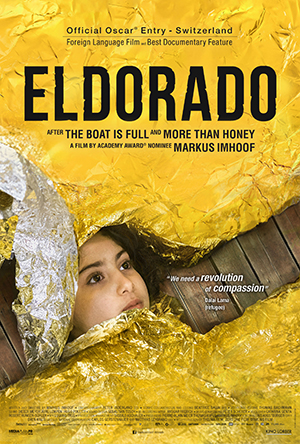Eldorado
Synopsis
Arguably the most pressing humanitarian issue of the twenty-first century, the refugee crisis continues to stir the consciousness of international filmmakers throughout the world. Indeed, as an indication of its enduring relevance since 2011 (when the first major wave of Syrians fled their homes due to political unrest and persecution), each new year brings dozens of motion pictures about that subject. Many of those films are heartfelt meditations on the responsibility that leaders of developed nations shoulder as an appropriate response to that crisis, in which millions of forcibly displaced people — largely from African countries (such as Somalia, South Sudan, and the Democratic Republic of Congo) — have sought asylum in the European Union (EU). Few of those fictional and nonfictional works, however, are as sensitively attuned to the uncanny parallels between past and present “immigration problems” as veteran director Markus Imhoof’s Eldorado. Taking its title from the mythical place — a legendary “city of gold” — where untold riches are thought to await the bravest of explorers, this documentary reveals the sad truth behind superficially uplifting stories of benevolent protection on the part of various EU member states. In fact, even after escaping their home countries, temporarily settling down in transit camps, and eventually making their way to secure areas in Italy and Switzerland (Imhoof’s own place of birth), asylum seekers are often subjected to inhumane treatment and forced to kowtow to criminal organizations that exploit them for their labor (as plantation pickers and prostitutes). The director, a pioneering figure in the history of nonfiction cinema (whose prophetically titled feature The Boat is Full [1981] was nominated for an Academy Award nearly four decades earlier), distinguishes his work from other refugee films by bringing in his own voice, his own childhood reminiscences. As a young boy during the Second World War, Imhoof witnessed his family take in an eight-year-old girl from Italy, transported to Zurich by the Red Cross. Named Giovanna, the malnourished recipient of foreign aid would soon be forced to return to Italy, but she found a permanent place in Imhoof’s heart through letters, photographs, and toys that were left behind. Giovanna thus become a touchstone in the filmmaker’s haunted memory of war and familial separation, sparking his present-day efforts to extend the same generosity of spirit to current political refugees and economic migrants whose inalienable right to protection is being ignored by many of the world’s governments.
Written by David Scott Diffrient

Filmmakers
Markus Imhoof
(2018)
Switzerland / Germany
91 min
Primarily in German with English subtitles
Screenings
Friday, April 12
4:30 p.m.
Lyric Cinema
Guest:
Dr. Julia Khrebtan-Hörhager will provide a contextualized talk on the refugee crisis in Europe prior to the film screening. There is no Q&A following the film.
Colorado Premiere